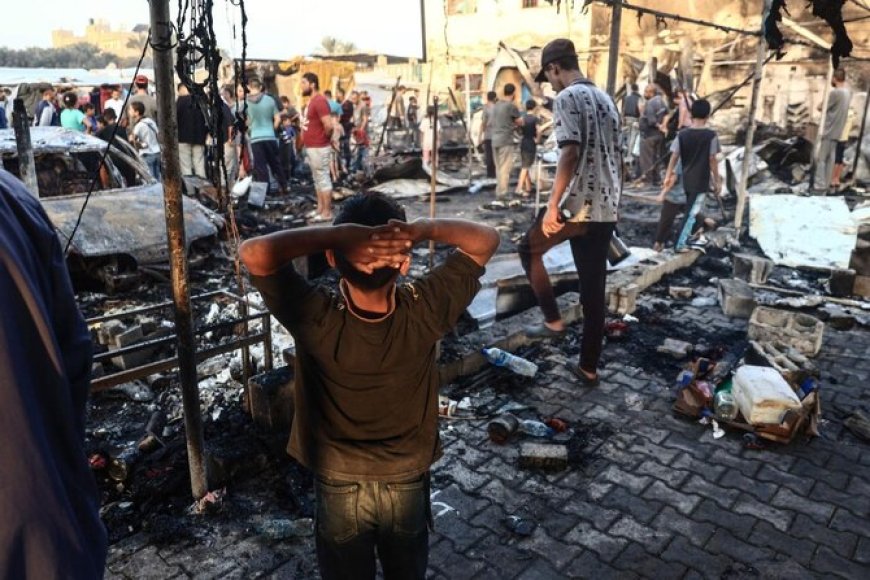"Policy of starvation" in Gaza is not okay with the US, says the US
Lina Thomas-Greenfield, the US ambassador to the UN, told the Security Council on Wednesday that the US is keeping an eye on Israel to make sure that its acts in the northern Gaza Strip do not show that it has a "policy of starvation."

Lina Thomas-Greenfield, the US ambassador to the UN, told the Security Council on Wednesday that the US is keeping an eye on Israel to make sure that its acts in the northern Gaza Strip do not show that it has a "policy of starvation." It would be "horrific and unacceptable," she told the 15-person group, and it would have effects on both US law and foreign law.
Thomas-Greenfield said, "The Government of Israel has said that this is not their policy and that food and other essential supplies will not be cut off. We will be watching to see if Israel's actions on the ground match this statement." This was a tougher stance from the US toward its longtime ally. US sources said on Tuesday that the US has told Israel that it needs to improve the humanitarian situation in the Palestinian enclave within 30 days or else the US might cut off military help.
"Rapid supplies and food must be sent to Gaza right away." "There must also be humanitarian pauses across Gaza so that people can get vaccinated and humanitarian aid can be delivered and distributed," Thomas-Greenfield said. Palestinian terrorists with Hamas launched a deadly attack on southern Israel on October 7, 2023. In response, Israel retaliated in Hamas-run Gaza, causing a humanitarian crisis in the surrounded area. Authorities say that more than 42,000 people have been killed and that 2.3 million people have been forced to leave their homes. Danny Danon, the Israeli ambassador to the UN, told the council that the problem in Gaza wasn't a lack of help because more than a million tons had been sent there in the last year.
He said that Hamas had taken over the aid for people in need. "Israel and its allies continue to send a lot of aid to Gaza, but it will never get to everyone who needs it as long as Hamas is in charge," he said. "Hamas has turned the humanitarian situation into a weapon." Israel says that Hamas is taking aid, but Hamas says that Israel is to blame for the lack of supplies. "UNCONSCIONABLE" The UN has long said that it is hard to get help into Gaza and spread it around the war zone, blaming Israel and chaos for the problems. Between Oct. 2 and Oct. 15, the UN said that no food help came into northern Gaza. Acting UN aid chief Joyce Msuya told the council, "Given the terrible conditions and intolerable suffering in north Gaza, the fact that humanitarian access is almost nonexistent is intolerable."
The Israeli military unit in charge of trade and aid shipments to Gaza said on Wednesday that 50 trucks from Jordan brought food, water, medical supplies, and protection equipment to northern Gaza. Msuya said that in Gaza, less than a third of the 286 humanitarian operations that Israel had planned with them over the past two weeks went off without any big problems or delays. She said that on October 12, an aid group got to two hospitals in northern Gaza after nine times of being turned away or slowed down by Israeli forces. They took more than a dozen very sick people to Al Shifa hospital in Gaza City. "These missions were carried out while fierce fighting was still going on," Msuya said, adding that at an Israeli checkpoint, drivers in the group "were treated humiliatingly during security screening and temporarily detained." "One child was kept alive by hand pumping oxygen for more than seven hours until they got through the checkpoint," she said.
Danon said that Israel's recent medical operation showed its "comprehensive" humanitarian efforts. He also said, "As always, we acted in accordance with international law, going above and beyond our obligations." Danon also talked about how the UN's Children's Fund (UNICEF) and the World Health Organization (WHO) started a second round of polio vaccines on Monday. The goal is to vaccinate 590,000 children under 10 years old during breaks in fighting in certain areas. Amar Bendjama, Algeria's UN ambassador, called Israel's humanitarian efforts into question. "How is it possible that we can give these kids shots but not feed them?" he asked. "It is clear that this is not just unintended consequences, but rather an intentional Israeli policy of starvation."













































